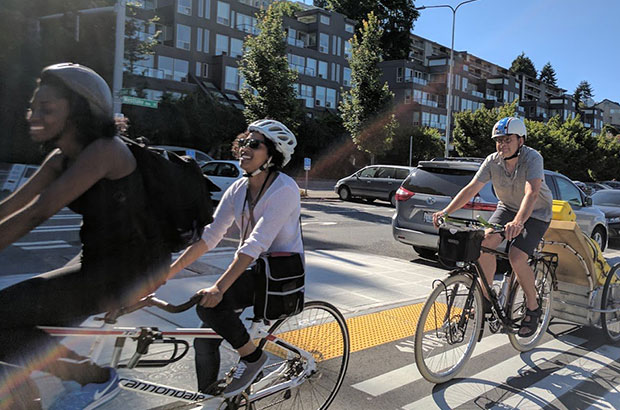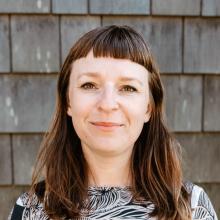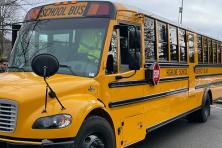While other parts of the world are suffering under record-breaking heat waves this summer, we in the paradisiacal Northwest can feel lucky that we’re not as afflicted by that particular impact of the climate crisis. (Not this month, at least.) In Washington, we can take pride in the brave strides we are making into a clean energy future; our new commitment to achieve 100% clean electricity will help curb the carbon emissions that cause global warming.
But even with a clean power grid, we’re still contributing massively to the problem. Transportation is, by far, the largest source of our greenhouse gas emissions, and they’re still increasing every year. Until we make serious progress to curb our tailpipe emissions, we’re going to keep on heating up the atmosphere. That’s why climate advocates are supporting a number of strategies for cleaning up our transportation, including a clean fuel standard, vehicle electrification, better access to transit, reducing the miles traveled by car, and making it safer to walk, scooter, and bike.
We need to pursue all of these choices now. That’s why connected, comprehensive, accessible bike networks are integral to cities’ plans for carbon reduction.
The more people feel safe bicycling, the more we can reduce our climate pollution. Right now, the average Washingtonian drives almost 13,000 miles annually, emitting over 10,000 pounds of carbon. Switching out car trips for clean modes such as bicycling can have a tremendous impact on reducing our carbon emissions, both personally and at scale.
There is an unmet demand for safe bicycling infrastructure. Right now, bicycling is not the most popular way to get around, but that doesn’t mean that everyone who is not bicycling has no interest in doing so. In Seattle, the most commonly cited reason for not biking is not the rainy weather or the hills—it’s not feeling safe.
The most common trip distance by car in the Puget Sound is less than a mile. Though not everyone is able to walk or bicycle that distance, many can, and would, if it were safer to do so. But, our current infrastructure makes it hard to choose alternatives. Protected bike lanes also result in fewer deaths for all road users, not just those on bikes!
People who bike (or want to) come from many different communities—and the needs are greatest where air pollution has been disproportionately harmful. National research shows that the lowest-income households bike the most for both transportation and recreation. Meanwhile, people of color and lower-income folks are more likely to be killed or seriously injured when walking or bicycling. Safe bicycling and pedestrian infrastructure is an equity issue for many reasons, and therefore we need to ensure that we create this infrastructure, especially in those communities who need it the most.
Many areas in Washington, especially those that are home to communities of color and lower-income families, are burdened with poor air quality. Over time, vehicle exhaust can cause lung and heart problems and premature death. Everyone knows that getting on a bike can be good for your health; But, because it helps cut pollution, it’s good for everyone else’s health, too!
Bicycling is a good transportation choice—and a powerful climate solution. As we shape our communities so they cut carbon pollution and are more resilient to climate change, we have the ability to improve them. Giving people the opportunity to bicycle, a clean transportation option that even benefits non-riders, is one of the many ways we are working on reducing climate pollution from transportation. Local governments must invest in comprehensive and accessible bicycle networks for all neighborhoods. We’re facing a climate crisis and need all of the clean transportation solutions we can get so people can choose which one best suits them. Good thing that these solutions will also improve traffic, our health, and our safety. We can make our communities healthier, more sustainable, and equitable. Let’s get those bike networks!





